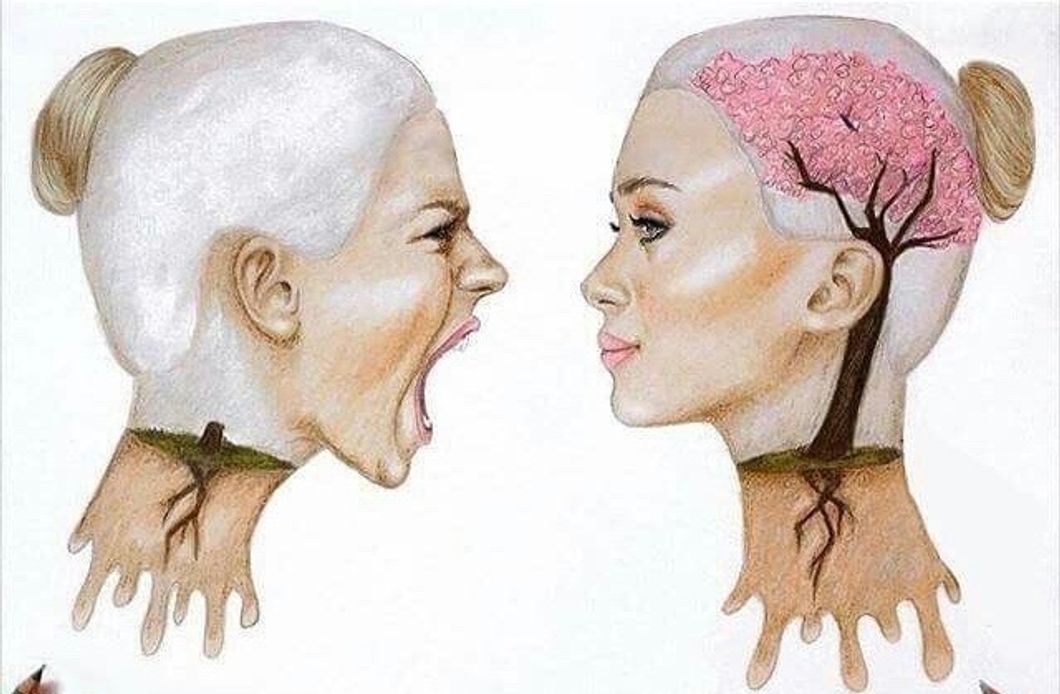We live in a world where "I'm sorry" is a courteous thing to say. It is necessary, and without saying or hearing it, we automatically assume disrespect. The word "sorry" has lost its true meaning in all of the chatter.
We use "I'm sorry" for anything and everything. I say "I'm sorry" when I bump into someone, just the same as I say "I'm sorry" for treating someone poorly or doing something actually wrong.
How can these things mean the same? How can it mean anything in a situation when you are truly sorry when you previously used it in the context of "I'm sorry for being late."
These two issues are not on the same level, and are not held to the same standards, so why do we use the same method to "help" the polar opposite situations.
I stumbled upon this way of thinking while scrolling through Pinterest now night, and I thought "Maybe I should take this into consideration."
Because I have trouble excepting "I'm sorry" from other people when there is an actual problem in my life. It does not feel authentic anymore. It is overused and over said. And sometimes I still get all frazzled when someone walks in front of me without saying anything.
But that's okay, because I know that at some point in time, I will be in a place where I do not need to hear it or say it anymore. "Pardon me" works just the same.
Instead of "I'm sorry for being late" you can replace it with "thank you for waiting on me."
Instead of "I am sorry for being so emotional, irrational, angry, rude, etc" we can say "thank you for being patient with me."
Instead of "I am sorry the house is a mess," how about "thank you for accepting the way I live."
Instead of "I am sorry for what you are going through," we can replace it with, "thank you for trusting me enough to share this information about your life. This is a really difficult situation, it must be really hard on you."
Instead of "I am sorry for ranting," we can say "Thank you for listening to me."
Instead of "I am sorry to ask for another favor," how about "thank you for helping me."
Instead of "I am sorry I made a mistake," we can use "thank you for pointing out my mistake. I will try not to do it again."
I am sorry makes everything about yourself. When you are apologizing for something you have done, it brings negativity to self. While sometimes, we need to
When someone tells us "I'm sorry you are going through this." we generally tend to respond with "It is okay, it is not your fault."
You see, when we apologize, we invalidate what the other is feeling and going through, making the situation about ourselves. When you are apologizing for something someone else is going through like a loss or a really tough situation, you are setting them up to make the it about you, whether it is your intention or not.
What if we started turning that negativity into something more positive? What about, "This is a tough thing you are dealing with, and you are handling it the best you can."
It means the same thing. It means we care, and because we care, we want to apologize. But we do not need to. When is the last time you did something, apologized for it, and never did it again?
Because I run late all of the time, I bump into people a lot, I get deep in my emotions constantly, I do not live in a perfectly picked-up area, and I am probably always going to talk a lot. I have previously apologized for all of these things, so what am I really apologizing for?
Apologizing for everything only makes us look at more negative things about ourselves and then brings that negativity to others. Thanking people not only validates them but brings gratitude into your life at the same time.
It helps you to look at everything that others do for you to accept you. On top of all of this, it radiates positivity. It lets the other person know that you notice what they have done for you. We can care without apologizing, unless it is truly necessary.
As I have begun trying to do this more, I have noticed a few changes in my life. Not only do I notice more things to be grateful for, but I also have noticed changes in relationships because they can receive a different and positive message of gratitude for them, and above all, the words "I'm sorry" when used in a correct situation, have begun to actually mean something to me again. When you change the way you look at things, the things you look at change.















